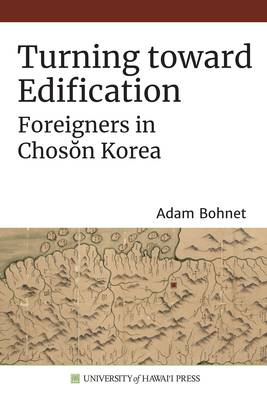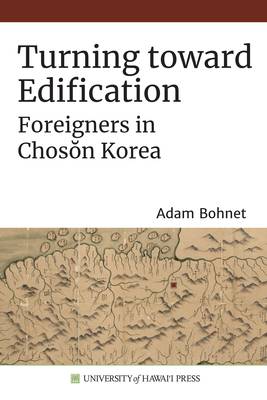
- Afhalen na 1 uur in een winkel met voorraad
- Gratis thuislevering in België vanaf € 30
- Ruim aanbod met 7 miljoen producten
- Afhalen na 1 uur in een winkel met voorraad
- Gratis thuislevering in België vanaf € 30
- Ruim aanbod met 7 miljoen producten
Omschrijving
Turning toward Edification discusses foreigners in Korea from before the founding of Chosŏn in 1392 until the mid-nineteenth century. Although it has been common to describe Chosŏn Korea as a monocultural and homogeneous state, Adam Bohnet reveals the considerable presence of foreigners and people of foreign ancestry in Chosŏn Korea as well as the importance to the Chosŏn monarchy of engagement with the outside world. These foreigners included Jurchens and Japanese from border polities that formed diplomatic relations with Chosŏn prior to 1592, Ming Chinese and Japanese deserters who settled in Chosŏn during the Japanese invasion between 1592 and 1598, Chinese and Jurchen refugees who escaped the Manchu state that formed north of Korea during the early seventeenth century, and even Dutch castaways who arrived in Chosŏn during the mid-1700s. Foreigners were administered by the Chosŏn monarchy through the tax category of "submitting-foreigner" (hyanghwain). This term marked such foreigners as uncivilized outsiders coming to Chosŏn to receive moral edification and they were granted Korean spouses, Korean surnames, land, agricultural tools, fishing boats, and protection from personal taxes. Originally the status was granted for a limited time, however, by the seventeenth century it had become hereditary.
Beginning in the 1750s foreign descendants of Chinese origin were singled out and reclassified as imperial subjects (hwangjoin), giving them the right to participate in the palace-sponsored Ming Loyalist rituals. Bohnet argues that the evolution of their status cannot be explained by a Confucian or Sinocentric enthusiasm for China. The position of foreigners--Chinese or otherwise--in Chosŏn society must be understood in terms of their location within Chosŏn social hierarchies. During the early Chosŏn, all foreigners were clearly located below the sajok aristocracy. This did not change even during the eighteenth century, when the increasingly bureaucratic state recategorized Ming migrants to better accord with the Chosŏn state's official Ming Loyalism. These changes may be understood in relation to the development of bureaucratized identities in the Qing Empire and elsewhere in the world during the seventeenth and eighteenth centuries, and as part of the vernacularization of elite ideologies that has been noted elsewhere in Eurasia.Specificaties
Betrokkenen
- Auteur(s):
- Uitgeverij:
Inhoud
- Aantal bladzijden:
- 284
- Taal:
- Engels
- Reeks:
Eigenschappen
- Productcode (EAN):
- 9780824884482
- Verschijningsdatum:
- 31/12/2020
- Uitvoering:
- Hardcover
- Formaat:
- Genaaid
- Afmetingen:
- 155 mm x 231 mm
- Gewicht:
- 544 g

Alleen bij Standaard Boekhandel
Beoordelingen
We publiceren alleen reviews die voldoen aan de voorwaarden voor reviews. Bekijk onze voorwaarden voor reviews.









